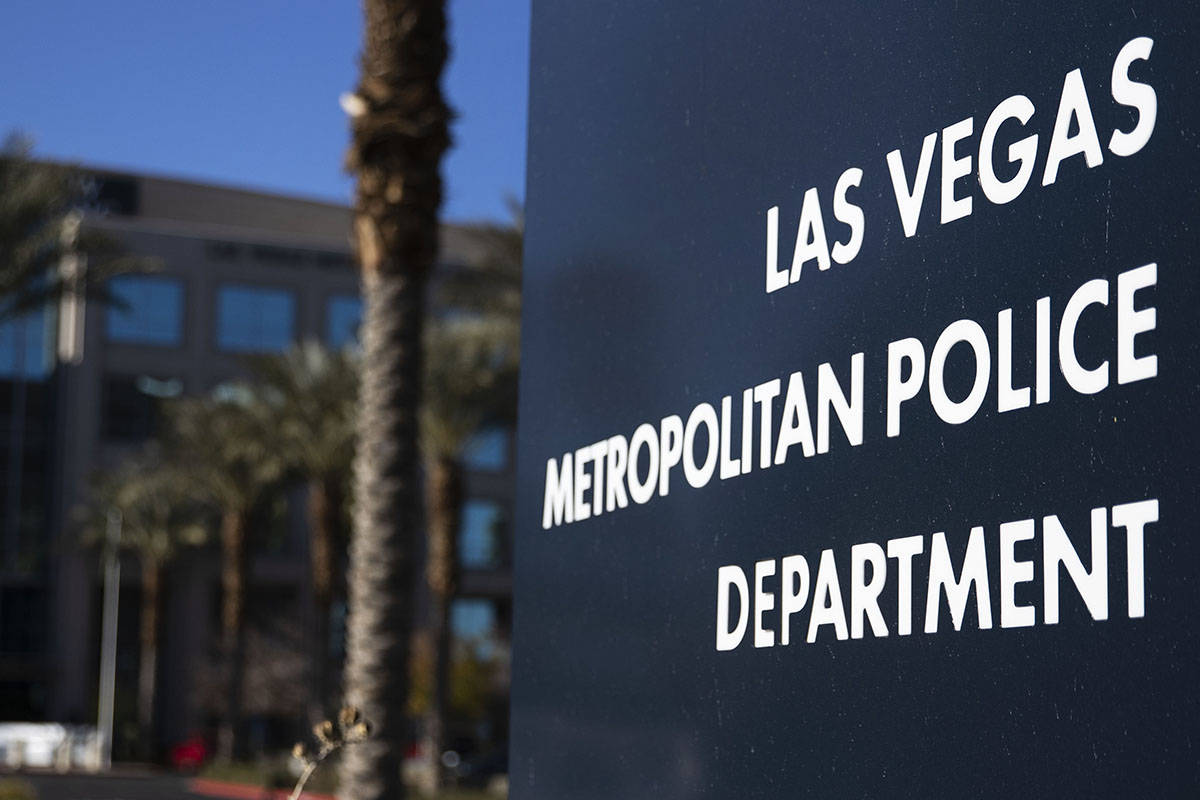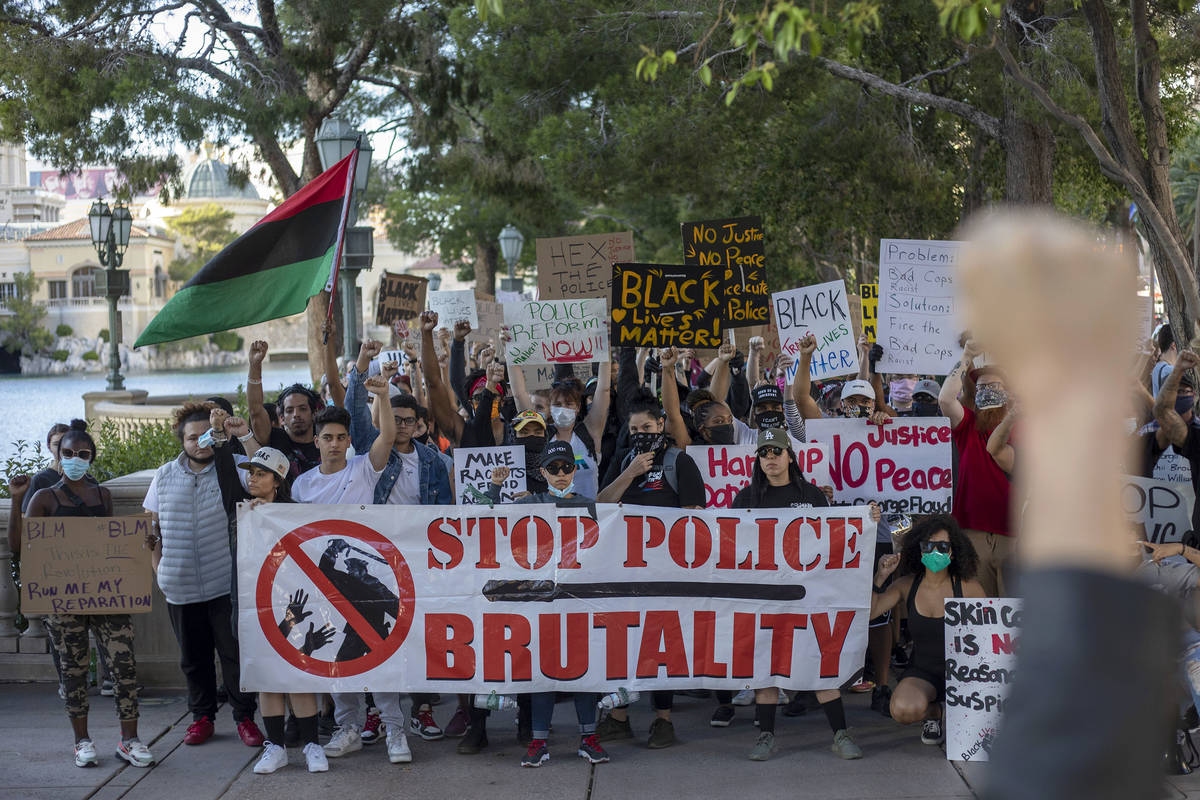Las Vegas police rarely held accountable for misconduct by board
Growing police misconduct claims nationwide bring new questions about the effectiveness of Clark County’s Citizen Review Board, established as an oversight agency more than two decades ago.
Three years of review board data analyzed by the Review-Journal show the agency almost always dismissed citizens’ complaints or sided with the department’s internal affairs determination. And relatively few people who complained to Metro appealed their cases to the board.
Out of nearly 900 cases the board received since 2018, only eight were referred to a hearing panel to decide whether Metro internal affairs made the correct decisions in response to a misconduct complaint, records show.
Martha Menendez, a senior fellow at UNLV’s Immigration Clinic, said the agency has not been very effective during the past two years she served on the board because it is “chummy” with police instead of holding Metro officers and internal affairs accountable.
“The sense I do get is that it’s very pro-cop,” she said. “The board has a friendly relationship (with Metro). It’s a lot more friendly than I thought it would be.” Menendez resigned from the board shortly after speaking to the Review-Journal, citing other commitments.
New board Executive Director Julie Kraig, who took the position in June and makes $83,605 a year, repeatedly declined an interview, but county spokesman Erik Pappa said the board is effective.
“It would be unfair and unduly simplistic to measure the effectiveness of the Citizen Review Board solely by how often it disagrees with the findings of Metro’s Internal Affairs Bureau,” he wrote in an email. “Any fair assessment would require a case-by-case review of written findings, which are a public record. Such a review would yield examples where the CRB has very clearly come to a different conclusion.”
The board, established in 2000 with 25 volunteer members, has subpoena power and, unlike Metro, releases the names of complainants and the police or corrections officers accused of wrongdoing. Complaints have to be filed within a year of the incident, and if not dismissed by the director or screening panel, are sent back to Metro’s internal affairs for further investigation.
The case then goes before a hearing panel to determine if Metro got it right. The board’s opinions are recommendations with Metro deciding whether to follow the independent agency’s decisions.
Board members assess complaints about excessive force, search and seizure, problematic interactions with the public and neglect of duty allegations, but their opinions are not published online and are only available through open records requests.
National outrage about abuse
Nationwide, outrage toward alleged police abuse and excessive force, often recorded on phone cameras, has been widespread. The 2020 death of George Floyd in Minneapolis sparked weeks of Black Lives Matter demonstrations last summer in Las Vegas and cities around the nation. The murder and manslaughter trial of former police officer Derek Chauvin, who video shows knelt on Floyd’s neck for nearly nine minutes while other officers watched, started this month.
More agencies around the country are releasing internal affairs records. California lawmakers in 2018 made many police misconduct files public. In New York, new legislation prompted the release this month of more than 320,000 accusations against current or former police officers. The Civilian Complaint Review Board records had been sealed for decades.
But a majority of states still keep the records hidden, according to a New York radio station survey after the 2014 killings of Eric Garner in New York and Michael Brown in Missouri.
WNYC found only a dozen states make the records public, but the survey wasn’t completely accurate when it said that Nevada Administrative Code seals internal affairs records. State law does not exempt internal affairs files from open records, and the law supersedes the administrative code. But Metro used court rulings that balance employee privacy against the public’s right to know in denying release of the files.
This year, at least 31 states have bills addressing police data collection and transparency, according to the National Conference of State Legislatures. Nevada lawmakers have not addressed the issue.
On Tuesday, the Legislature introduced a bill that would allow the state attorney general to investigate civil rights complaints against police departments.
Samuel Walker, criminal justice emeritus professor at the University of Nebraska-Omaha, said his research on citizen review boards shows the agencies do little to improve police departments because the boards often just rely on an internal affairs investigation that could be biased or flawed.
“They are stuck with what IA did and have no capacity to dig into the facts of a particular case,” he said. “It’s not surprising they don’t have any impact.”
In 2019, Nevada’s Legislature actually made it more difficult to investigate misconduct by limiting the time for an investigation and preventing reassignments until it is completed. Many of those provisions were reversed after Floyd’s death in last year’s special session.
Internal affairs transparency
Metro’s internal affairs bureau investigates complaints of officer misconduct first, but Southern Nevada residents unhappy with the department inquiry can ask the review board to look into the case.
Metro Assistant Sheriff Chris Jones, who oversees the internal affairs operations for a department of about 3,200 sworn and 1,000 corrections officers, used the review board as justification for the department’s refusal to release detailed internal affairs investigations of officers with repeated complaints to the Review-Journal.
“The Citizen Review Board is that neutral third party,” he said. “They have subpoena power and can look into it.”
Metro union President Steve Grammas agreed that officers’ names should be kept secret.
“I do stand by the department’s right to privacy for its officers,” he said. “Everybody could slant that one search and seizure and make a picture that this officer is the worst person in the world after the investigation was done and determined the allegation was unfounded.”
ACLU of Nevada Executive Director Athar Haseebullah said Nevada needs to make internal affairs records and officers with complaints public. “I think what we have to do is we really have to push legislative, and from a policy perspective, for increased transparency,” said Haseebullah, who recently was appointed to the review board.
Representing the community
Board members, mostly lawyers, business people and academics, are appointed by Metro’s Fiscal Affairs Committee, which is made up of two county commissioners, two Las Vegas City Council members and a citizen. The board has two employees and a budget of about $270,000 a year.
In October 2020, the board noted the diversity represented in new members.
A big welcome to the many new 2021 Board Members appointed by @ClarkCountyNV and @CityOfLasVegas! Our new board is a reflection of our diverse community, and its members are excited to serve.
10 Men
15 Women
10 White
8 Black
3 Hispanic
2 Asian
1 Muslim
3 LGBTQ pic.twitter.com/lpU0XmXoA1— LVMPD Citizen Review Board (@CRBlasvegas) October 15, 2020
Clark County Commissioner Jim Gibson said the board is designed to represent the community. “I think this committee has improved over the course of the months and years, and I’m aware of what is happening in the quality of the committee — its drive and training have been stellar,” he said. “I’m expecting things are going to get better.”
But police and board data shows that while Metro received more than 8,000 complaints since 2018 — only about 10 percent of the complainants asked for a board review. And only 25 cases were referred back to Metro for additional investigation with the others either dismissed or the board panel siding with internal affairs.
Gibson said he was surprised to hear that the board rarely deviates from internal affairs recommendations because he often hears that police are not happy with board actions. “It’s not a whitewash,” he said.
New director tackles cases
In 2020, the work of the board slowed when its former director, Andrea Beckman, went on medical leave for cancer treatment. She died four months later, leaving a backlog of about 200 cases. Since then, the board has caught up, but members still had 122 cases they hadn’t reviewed at the end of 2020, records show. Pappa said those cases do not represent a backlog because they are not more than six months old.
Pappa also provided a handful of examples where the board differed with Metro’s view of a case and said the board referred about 20 cases to internal affairs that the agency hadn’t investigated.
The review board often sides with internal affairs because of reforms at the state’s largest police department, Pappa said, including changes in response to a 2011 Review-Journal series about the agency’s problematic police shooting rate. The reforms included making information about shootings public, improving de-escalation training and having incidents reviewed by a use-of-force board, which includes non-police officers, and a Critical Incident Review Team.
“CRB frequently does agree with the findings of Metro’s IAB,” Pappa wrote. “This should not come as a surprise since longtime independent observers of Metro agree that the department has evolved over the years into a well-run and professional law enforcement agency that is in many ways a model for the nation.”
Several review board members refused or did not respond to requests for interviews, with one referring questions back to Metro.
“(T)he official policy is that CRB members cannot speak for the board beyond the judicial decisions that are made collectively, and are publicly available,” board member Katie Durante, an assistant Nevada State College criminal justice professor, wrote in an email declining an interview. “It is my understanding that general questions about how the CRB operates should be directed to LVMPD.”
In justifying Durante’s and Kraig’s refusal to comment, Pappa cited state law that says board members have to keep the details of cases confidential, but the law would not prohibit board members from generally discussing the effectiveness of the agency.
Menendez said she would like to see the board be more independent and hold Metro more accountable.
“I think accountability only comes in when the public gets involved when there is a critical mass that starts making noise,” she said.
Contact Arthur Kane at akane @reviewjournal.com. Follow @ArthurMKane on Twitter. Kane is a member of the Review-Journal’s investigative team, focusing on reporting that holds leaders and agencies accountable and exposes wrongdoing.

























